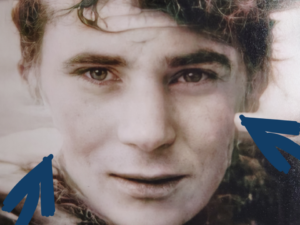
Celebrating Gypsy, Romani and Traveller (GRT) lives, Life, Love and Laments runs until 22 June at Museum of Liverpool. Here, our Festival interns explore the exhibit’s intentions.
Written and produced by Lucinda O’Donnell and Harley Mullen
Liverpool John Moores has partnered with Unitemps to produce a Discovery Internship programme for Level 6 graduates. This has provided graduating students with an opportunity to work with local organisations, gaining insight into working life. We were lucky enough to secure internships with the Liverpool Irish Festival, and have been learning about working in the arts.
Chiefly, we have had the opportunity to learn more about each core groups within the Irish community in Liverpool. We’re grateful to have had the opportunity to enlighten ourselves over issues faced by the Gypsy, Romani and Irish Traveller communities, by embarking on this work and talking to the people in this article.
In the build-up to opening day (6 Jun 2022) we spoke to the collaborators, involved in the curation of the digital show, Andy Kelly from Irish Community Care and Charmaine Abdul-Karim from Pride of Romani. Both had interesting takes on their experiences working in collaboration with each other.
Andy Kelly
Irish Community Care has been a charity for around 60 years, supporting all Irish and Irish Travelling communities across the north west. Andy Kelly, the charity’s Community Development & Engagement Lead told us: “We provide advice, advocacy, and support (…). That can be anything from benefits queries; Irish passport queries; advice about personal independence payments and disabilities”. Irish Community Care initially birthed the idea for the exhibition. “We also provide cultural activities and ‘moving for change’, for nomadic Gypsies and Travellers, which explains our work with this exhibition”, he added. In his role, working closely with the Gypsy, Romani, Traveller community, Andy has learned more about the challenges presented to nomadic peoples:
“I think that there are a lot of negative tropes in the press surrounding the Gypsy, Romani, Traveller community. Certainly, since I’ve been working within the role that I have, I’ve definitely found that Travellers in particular feel like ‘place invaders’ (…).
Barriers
In ‘moving for change’ for Gypsies, Romani and Travellers, Andy stressed the importance of changing the existing narrative surrounding the community, which has been largely propagated by negative press, into something more positive. “It’s important to shed light on these stories to change the narrative surrounding the community (…) ‘Educate and illuminate’ is our main objective with this exhibition”.
Charmaine Abdul Karim
Charmaine Abdul Karim’s grassroots organisation Pride of Romani launches 24 June 2022. The organisation centres on preserving GRT heritage, and engaging with children in the community, to encourage them to embrace their ethnicity. Charmaine told us “a lot of Gypsy and Travelling children hide their ethnicity (…) I just wanted to do something that empowers our people”.
An important part of Pride of Romani‘s work is partnering with the public sector to educate the wider community; “I call it re-educate. We want to provide information so people can learn more. Sometimes ignorance is through no fault other than not knowing enough. And, people don’t know enough truthful information from the community itself”.
Trust
Charmaine found it difficult trying to convince her mother to take part in the exhibition at first. “I first had to get round my Mam; she’s a very private person, she doesn’t like talking to people that are outside of our family and community”. She added that there is a deep reluctance within the community to trust outsiders.
Negative press such as Channel 4’s My Big Fat Gypsy Wedding had huge repercussions for the GRT community. “It was people’s har har for 20 minutes. The results […] were that our young girls were being sexually assaulted in the streets […] people thought it was okay to grab hold of them like they’d seen on television. Our husbands, brothers and fathers lost work because people thought that they were some kind of sexual predators”.
Charmaine stressed the importance of ‘re-education’, ‘‘I wish that there was more of what the exhibition is. Showing true representations of GRT communities. Because that would be as fun and brilliant to watch as racist series like the ones on Channel 4”.
Here’s a snippet from our chat with Charmaine:
Lessons learned
The feeling we tookaway from our contact with the exhibition and people was that the GRT communities are so much more than we have seen.
The exhibition slides are available as a PDF on the events page. Here you can browse at your own pace, even after the exhibit closes at the Museum. We recommend you take the time to read them, and learn more about this community’s intricate history.
